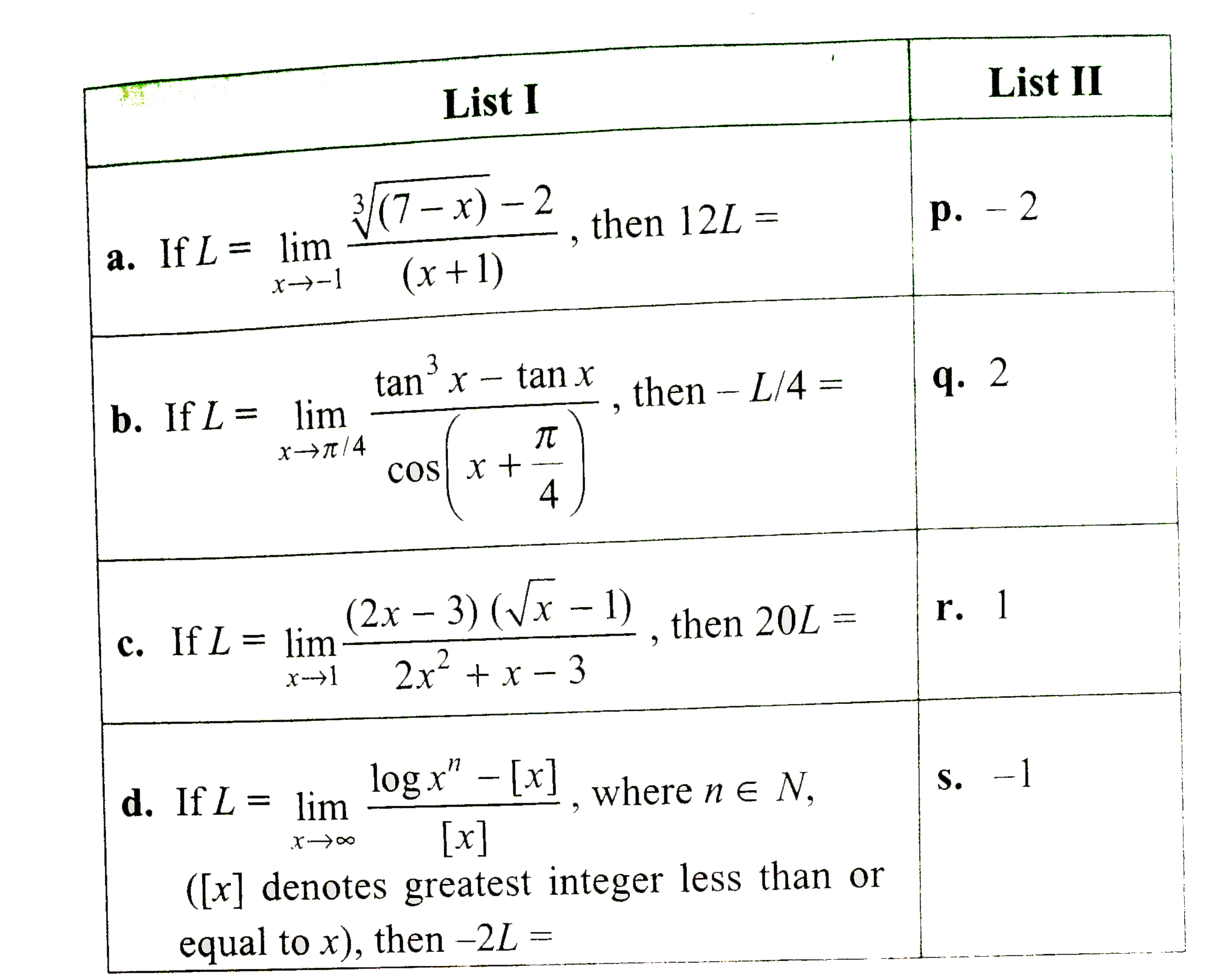If f(x)=|x−1|−[x],where[x] is the greatest integer less then or equal to x , then f(1+0)−1,f(1−0)=0 f(1+0)=0=f(1−0) (lim)x→1f(x)eξsts (lim)x→1f(x)does¬eξstSolution in Tamil
limx→0[f(x)]=0
limx→0[f(x)]=1
limx→0[f(x)x] does not exist
limx→0[f(x)x] exists
The correct Answer is:A, D
f(1+0)=limh→0(|1+h−1|−[1+h])=limh→0(h−1)=−1
f(1−0)=limh→0(|1−h−1|−[1−h])=limh→0(h−0)=0
Topper's Solved these Questions
- BOOK - CENGAGECHAPTER - LIMITSEXERCISE - Exercise (Comprehension)20videos
LIMITS
- BOOK - CENGAGECHAPTER - LIMITSEXERCISE - Exercise (Matrix)5videos
LIMITS
- BOOK - CENGAGECHAPTER - LIMITSEXERCISE - Exercise (Single)76videos
LIMITS
- BOOK - CENGAGECHAPTER - JEE 2019EXERCISE - Chapter 109videos
JEE 2019
- BOOK - CENGAGECHAPTER - LINEAR COMBINATION OF VECTORS, DEPENDENT AND INDEPENDENT VECTORSEXERCISE - DPP 1.210videos
LINEAR COMBINATION OF VECTORS, DEPENDENT AND INDEPENDENT VECTORS
Similar Questions
Find the domain of f(x)=√|x|−{x} (where {⋅} denots the fractional part of x).
06:18View SolutionMatch the following lists:
 08:54View Solution
08:54View Solution(lim)x→0[sin(sgn(x))(sgn(x))], where[.] denotes the greatest integer function, is equal to (a)0 (b) 1 (c) −1 (d) does not exist
04:22View SolutionIf y = y(x) is the solution of the differential equation, xdydx+2y=x2 satisfying y(1) = 1, then y(12) is equal to
02:54View SolutionThe number of integral values of p for which (p+1)ˆi−3ˆj+pˆk,pˆi+(p+1)ˆj−3ˆk and −3ˆi+pˆj+(p+1)ˆk are linearly dependent vectors is q
03:56View SolutionIf f(x)={sin[x][x],for[x]≠00,for[x]=0,where[x] denotes the greatest integer less than or equal to x, then (lim)x→0f(x) is 1 (b) 0 (c) −1 (d) none of these
05:30View SolutionIf f(x)=3x2+ax+a+1x2+x−2, then which of the following can be correct (lim)x→1f(x)eξstsa=−2 (lim)x→−2f(x)eξstsa=13 (lim)x→1f(x)=43 (lim)x→−2f(x)=−13
01:39View SolutionA Function f(x) satisfies the relation f(x)=ex+∫10exf(t)dt. Then (a)f(0)<0 (b)f(x) is a decreasing function. (c)f(x) is an increasing function. (d)∫10f(x)dx>0
03:28View SolutionIf for a continuous function f,f(0)=f(1)=0,f'(1)=2 and y(x)=f(e^(x))e^(f(x)) ,then y'(0) is equal to a.1 b.2 c.0 d.none of these
12:15View SolutionIf f(x)=x(e|x|+[x]−2|x|+[x]) then (where [.] represents the greatest integer function) (lim)x→0+f(x)=−1 b. (lim)x→0−f(x)=0 c. (lim)x→0□f(x)=−1 d. (lim)x→0□f(x)=0
01:50View Solutionयदि f(x)=x.e1/x−e−1/xe1/x+e−1/x,x≠0
f(0)=0, तो सिद्ध कीजिए कि f(x) बिंदु x=0 पर अवकलनीय नहीं है03:37View SolutionIf f(x)=⎧⎪ ⎪⎨⎪ ⎪⎩e1x−1e1x+1, for x≠01, for x=0, then f is
02:28View SolutionIf f(x)=e1/x−1e1/x+1 for x≠0,f(0)=0 then at x=0, f(x) is
02:06View SolutionIf f(x)=3x2+ax+a+1x2+x−2, then which of the following can be correct (lim)x→1f(x)eξstsa=−2 (lim)x→−2f(x)eξstsa=13 (lim)x→1f(x)=43 (lim)x→−2f(x)=−13
02:06View SolutionIf f(x)=x(e|x|+[x]−2|x|+[x]) then (where [.] represents the greatest integer function) (lim)x→0+f(x)=−1 b. (lim)x→0−f(x)=0 c. (lim)x→0□f(x)=−1 d. (lim)x→0□f(x)=0
01:49View SolutionLet f(x)=1−cosxx2, when x≠0, f(x)=1, when x=0 . Show that f(x) is discontinuous at x=0 .
View Solution

